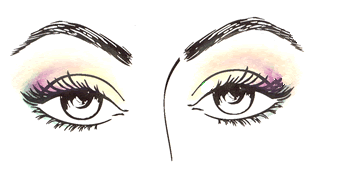
FACADE
A former student of mine recently e-mailed me about her résumé. She asked, "Is it right to make myself look better than I really am?"
I replied, "You put makeup on every morning don't you?" Instantly she saw the connection and it made perfect sense to her. Analogies can be a very powerful teaching tool.
A facade is a false, superficial, or artificial appearance or effect. Wanting to appear better than we really are is a common trait of human nature. We all want to look better and seem better than we really are. I think it was George Carlin who said, "We all think we are better than average drivers," but I am fairly certain that more than one person will claim to have said it first–whether they did or not.
The need to appear better or smarter than we really are manifests itself in many ways. A common one is called the hindsight bias, or what I call the 'I knew it all along' bias. There is a natural tendency to over-estimate what we knew beforehand based on additional knowledge that we learned later. "I knew I shouldn't have married that idiot" Really? If you knew it when you got married, then you are the idiot.
Most people, unless they are suffering from some psychological abnormality such as depression or low self esteem, have unrealistically positive views of themselves, and tend to perceive themselves as being better than average on a variety of desirable attributes. People who run for public office have a double dose of this. Studies have verified this tendency in areas of honesty, cooperativeness, rationality, driving skill, health and intelligence.
If we are normal, we also tend to have unrealistic optimism. This refers to a bias in judgment that leads us to believe that our futures will be better and brighter than those of other people. We tend to feel we are more likely than others to graduate high in our class, to get a good job, obtain a high salary, enjoy our first job, give birth to a gifted child, live a long life, and find the perfect mate. My optimism in this last area remains strong in spite of a lifetime of failures.
People also feel they are less likely than their peers to have drinking problems, get fired, get divorced, become depressed, or suffer physical problems. People who are about to join an organization or group tend to be unrealistically positive about the benefits that they will obtain from their membership, and they expect to receive more rewards than the average group member.
If all this self-deception isn't sufficient, most of us have the illusion of being in control. We falsely believe that we can control uncontrollable events, and we overestimate the extent to which our actions can guarantee a certain outcome. We also tend to take a disproportionately large share of the credit for group successes and tend to accept too little responsibility for group failures. John F. Kennedy put it succinctly when he said, "Victory has a thousand fathers, but defeat is an orphan."
If you ask successful people why they were so successful, they tend to attribute their success to internal / personal reasons. If you ask them why they failed, they tended to cite factors out of their control.
I started thinking about all of this in the shower one morning when I noticed some liquid soap that my houseguest, Jessica, a recent student of mine, had put there. She was using Neutrogena "Deep Clean." My first thought was, how deep does it clean? Unless she was using it in an enema, it probably wasn't going very deep. Then I noticed the plethora of specialized cosmetics and cleansers that she had deposited in my bathroom. Each was promoting some special power to enhance the beauty, radiance, softness, or whatever. A perfect example of the facade industry was sitting around in my bathroom.
The point of this is that we, as humans, are a vain bunch of animals who seem, more so than other species, to be obsessed with putting on a facade in order to appear even better than we already think we are -- and we display illogical optimism about our ability to do so. What else can explain the billions of dollars that are expended in the purchase of products that claim, and usually falsely, to make us feel better, look better, or perform better? And when we purchase these things, we are overly optimistic about how much they are going to help us.
Marketing has capitalized on this weakness of ours to be optimistic and to appear to be better than we are. Most of us spend a good bit of time each day putting on our facades or carrying them with us, and we think we are fooling everyone. We probably are fooling some, but not to the extent that we think.
I think I've written a good opinion piece here. And as long as I don't show it to anyone, I can go right on thinking that. If you read it and think it's ho hum or off the mark, I'll attribute it to your inability to comprehend my deep insightfulness. If you think it's great, I'll strut around awhile and write something else even better.